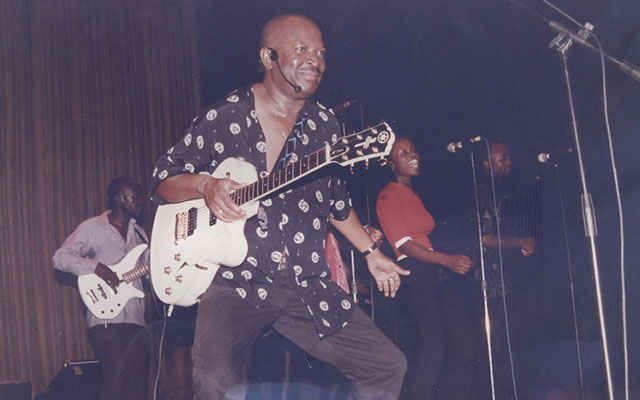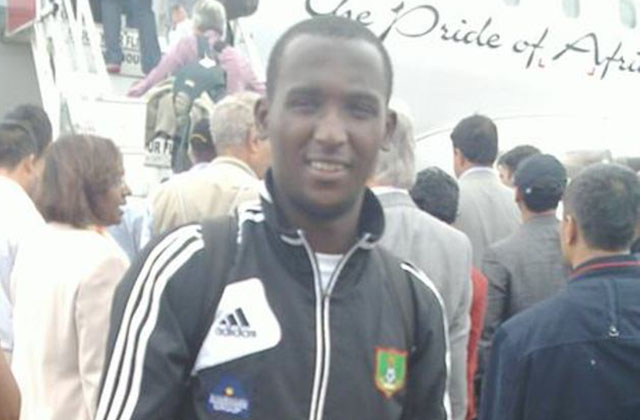Trumpet that shaped Tanga’s life

Godwin Muzari Arts Editor
Tanga WekwaSando does not look 63. He appears younger. Maybe a lifestyle of eating traditional food and exercising regularly has kept him in that shape. Maybe it is his stature that naturally cheats age.
This man has been around for longer than a stranger would estimate. And in those years, he has had his fair share of fame, fortune and popularity.
The attributes come from his journey on the music landscape and a bit of political involvement. Like most musicians would always say in narrating their profiles, Tanga’s journey began when he was a boy – blowing the horn in a church band in the Salvation Army. That distinct horn sound in Tanga’s music is laden with symbolic expressions of the man’s initiation into public performances.
That is probably why he appears to get carried away to a spiritual world when he blows his horn on stage during his performances. The attachment to the church band was a blessing that Tanga needed to come out of his shell of doing music secretly.
He had clandestinely attended tea parties in Highfield where he grew up. He would join other boys that went to the parties to dance for a few coins before he started learning home-made guitars that were also played at these ghetto events.
That time it was a taboo for a children to tell their parents that they wanted to pursue music because it was regarded as an art for people without direction in life. So, getting a slot in the church band became a justifiable reason for Tanga to be involved in music.
The musician’s real name is Ernest Tanga Kambadzo Sando and he says he became popular as “mukomana wekwaKambadzo” as he blew the horn with expertise at church functions.
“I will never forget one church conference in Chiweshe where I surprised many with a dramatic act that we did as a band,” Tanga recalled as he went down memory last week.
“When the band was called to perform, I went and hid behind huge rocks that were nearby. It was an open-air event. When other band members started performing most people were surprised that ‘mukomana wekwaKambadzo’ was not part of the group.
“The band played for some minutes and when the first song peaked, I blew the trumpet from behind the rocks and emerged from my hiding, blowing the horn with energy and style as I slowly moved to the stage to join other band members.
“There were wild cheers, clapping, ululation and whistling from the crowd and the environment just became electric. I felt encouraged and also performed wildly. Everyone was talking about the performance when the conference ended.”
Such performances gave Tanga confidence to pursue music further. Greenford Jangano of Harare Mambo Band (popularly known as Harare Mambos) heard about the boy who was making music exploits in Highfield and he approached Tanga.
“I was still in school but I agreed to join the band. I could not let the opportunity go. They had to make arrangements for me to be allowed to join them at shows. We performed at places like Hotel Elizabeth, Club Tomorrow and Federal Hotel.
“I continued working with the group until I completed my secondary education and got good experience. I will always cherish the days at Harare Mambos where I worked with talented musicians.”
After working with Harare Mambos for six years as a vocalists and trumpeter, Tanga became one of the founding members of Unitee Band that had the likes of Louis Mhlanga, Chris Chabuka and Clancy Mbirimi.
He also worked with Sabu (Soul and Blues Union) and later formed Octave Band that also performed at various popular night spots.
“When we formed Octave we did not have a good drummer who was available in Harare and we heard about Bothwell Nyamhondera who was in Mutare. We invited him and he came to join the band and we had a good team.”
In 1978 Tanga relocated to Botswana where he worked with Gaborone City Orchestra and got experience of shows in a foreign land. The musician then got a scholarship to study in the United States where he studied communication, finance and economics.
He formed a band with other students at the university and they would perform at various functions. After university he went to work in New York and continued doing music.
He returned home in 1988 and reunited with Nyamhondera, Mhlanga and Chabuka. That was the formation of the group Giraffe that became popular with hits “Mahobho”, “Stokononzi”and “Vakomana Vekwedu”.
After a few years in the country, Tanga became a councillor in Highfield and briefly shelved active music to pursue his new role. He also worked for various local companies in different capacities. He returned to music in early 2000s and the album “Wake” marked his great bounce-back.
Successive albums “Shungu” and “Zambezi Falls” also did well and Tanga became a household name in township jazz. He took a brief break and returned this year with “Knock Knock”. He also did a remix of “Wake” with Ex-Q recently.
To show his passion for showbiz Tanga built PaFio complex that now houses Joy Centre entertainment joint that is run by David Mudzudzu.
Tanga has promised to develop the place more and incorporate other services that complement showbiz. Musically, he continues recording and doing shows at various upmarket places.











Comments